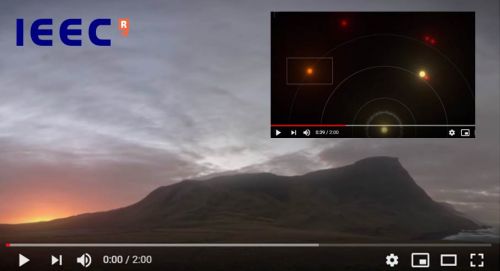
23/11/2018
Astronomers led by IEEC reveal a cold super-Earth around Barnard’s star
Astronomers led by IEEC reveal a cold super-Earth around Barnard’s star
As mentioned last week in our news about the important discovery made by CRAG’s researchers that have obtained plants more resistant to water scarcity, Barcelona Synchrotron Park (BSP) surrounding area is certainly the park’s prime value offered to its companies.
This environment is made of a dense business fabric and the leading research centres of the neighbouring BSP’s Autonomous University of Barcelona (UAB) partner, including CRAG or the Institute of Space Studies of Catalonia (IEEC) from which an international team of astronomers led by Ignasi Ribas of IEEC and Institute of Space Sciences (ICE, CSIC) has found a candidate planet in orbit around Barnard’s star.
Barnard’s star is the closest single star to the Sun and second only to the Alpha Centauri triple stellar system. The team used about 18 years of observations and combined them with new observations with the CARMENES planet-hunter spectrograph at Calar Alto/Spain and other facilities.
Astronomers obtained significant evidence of a planet with mass just over 3 times the Earth’s mass orbiting the red dwarf star every 233 days. This result published last week in the journal Nature would place the super-Earth near the so-called snow-line of the star, where it is likely to be a frozen world.
Video here.
This environment is made of a dense business fabric and the leading research centres of the neighbouring BSP’s Autonomous University of Barcelona (UAB) partner, including CRAG or the Institute of Space Studies of Catalonia (IEEC) from which an international team of astronomers led by Ignasi Ribas of IEEC and Institute of Space Sciences (ICE, CSIC) has found a candidate planet in orbit around Barnard’s star.
Barnard’s star is the closest single star to the Sun and second only to the Alpha Centauri triple stellar system. The team used about 18 years of observations and combined them with new observations with the CARMENES planet-hunter spectrograph at Calar Alto/Spain and other facilities.
Astronomers obtained significant evidence of a planet with mass just over 3 times the Earth’s mass orbiting the red dwarf star every 233 days. This result published last week in the journal Nature would place the super-Earth near the so-called snow-line of the star, where it is likely to be a frozen world.
Video here.
More news
29/09/2016
Barcelona, a Friendly Ecosystem for Start-Ups
22/09/2016
Barcelona, capital of particle accelerators science and technology
15/09/2016
Tech Companies With More Than $1 Million Raised: Barcelona Ranks 5th In Europe
09/09/2016
UB and UAB Universities Stand out in Spain According to Main International Rankings
31/08/2016
New CaixaBank's Data Center Implementation Completed In Barcelona Synchrotron Park
25/08/2016
Barcelona, 4th most creative city in the world









